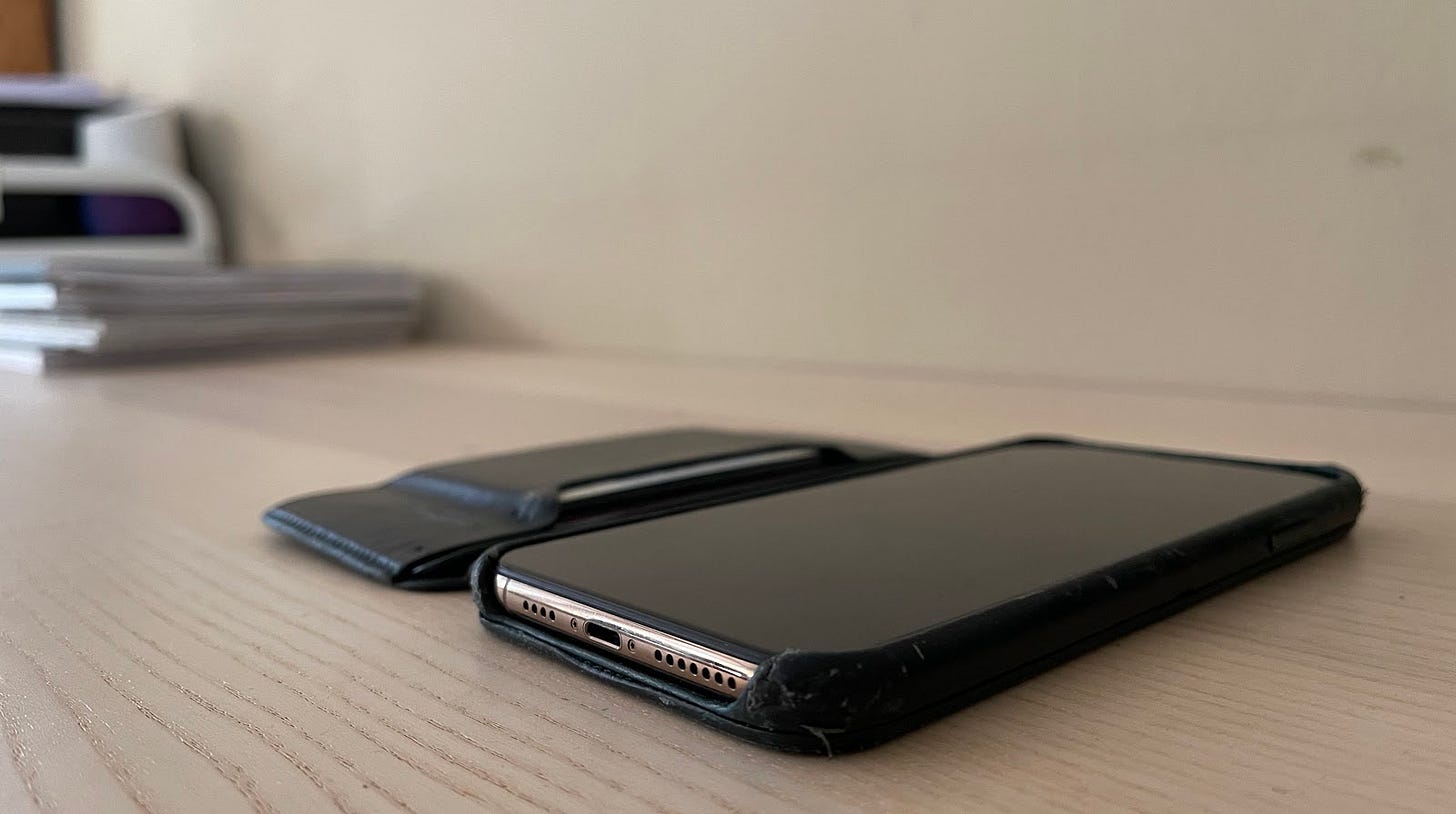One thing you can do?
Put your phone in a case...
Simple climate action // I S S U E 1 8 // D I G I T A L L I F E
Upgrading what we care about
A new smartphone is so immaculate, so gleaming and dazzlingly beautiful that it seems a travesty to wrap it in an ugly case. So until recently, I never used a cover. I’d take it everywhere — and soon it was scratched and dropped everywhere as well. I’ve smashed screens, broken touchpads, taped broken phones together, and then bought new phones when they were beyond repair.
Better to have a damaged but beautiful phone than a perfect one in an ugly case?
That changed in late 2018. I found a folio case that is probably deeply uncool, but protected the front and the back, and stored my bank cards and driver’s license. This weekend, after more than two years, I wrestled my phone out of the case to find… it’s completely perfect. Barely a scratch on it.
Old cases saving new phones. Photo: Jemima Kiss
It’s easy to take for granted things we use every day. And we’ve been encouraged to think of these luxury devices as semi-disposable — despite being assembled in one of the most complex manufacturing processes on Earth. Endlessly replacing digital devices comes at a cost to our wallets, and the climate. Slowing our digital lives, our devices as well as our digital consumption, pays dividends. That’s what I’ll be doing as I enter the new year.
Most of all, I’ll be talking to the companies that run my digital life, and asking for them to go emissions-free. As we discovered, some tech companies have made progress striving to eliminate emissions (though they’re not there yet). I want the rest to get there faster.
Jemima Kiss
Ask for more
Our challenge this month is less of a challenge and more some simple advice. As we’ve explained, our digital carbon footprints are heavily influenced by a few very powerful technology companies who have the position and resources to reduce emissions at scale. Those companies need to be making big changes. Rather than worrying about trying to cut down the number of emails we send, here’s something we can meaningfully do to reduce the emissions of our digital lives.
Push for action: To remove carbon from the system, we need to accelerate the shift to renewables. Most massive tech companies are committing to 100% renewable energy (Amazon, Microsoft, Apple), but a few have yet to fully commit to eliminating emissions (looking at you, Oracle). More companies should be going further. If you have just ten minutes to spend taking climate action this month, use it to call for more action from a company you rely on. Customize the template below, and go get ‘em. Let us know how they respond.
Dear [COMPANY],
Thank you for taking the first steps to reduce emissions at [COMPANY]. I’m reducing my family’s carbon footprint, and will be using low-carbon products where possible.
As I’m a long-time user, I’d like to know what you're planning to do to eliminate your company’s carbon footprint. Firms like Google have recently committed to only consuming zero-carbon energy around the clock by 2030.
This is a great start. Please let me know what you plan to do to reduce emissions, and if you plan to adopt a zero-carbon policy.
Many thanks,
[NAME]
Amazon: Email Jeff Bezos’ office: jeff@amazon.com
Apple: Email Apple or Tim Cook’s office tcook@apple.com
Facebook: Contact Facebook
IBM: Contact IBM
Instagram: Email Instagram support@instagram.com
Intel: Contact Intel
If you have your own business, talk to your own employer about their climate policy. And if you’re running your own organization, can you move to low or zero-carbon? Hats off here to Tom Kiss, Jemima’s brother, who’s been doing this regularly with suppliers for his new, zero-carbon web design agency. Tom researches companies before signing up with them, scoring them on their carbon policy, whether they use renewable energy, their carbon footprint, and the energy efficiency of their website. If they don’t make the grade, they don’t get his business. Could you apply this to your work too?
That’s it! Enjoy it, and make notes of what you find helpful and what’s hard. Reply to this email to send us feedback. If you’d like to share your progress, find us on Facebook or Instagram. #hothousechallenge
Hothouse is a weekly climate action newsletter written and edited by Jemima Kiss, Mike Coren and Jim Giles. We rely on readers to support us, and everything we publish is free to read.








Really loving all the content JK and team, well done. Feeling inspired x